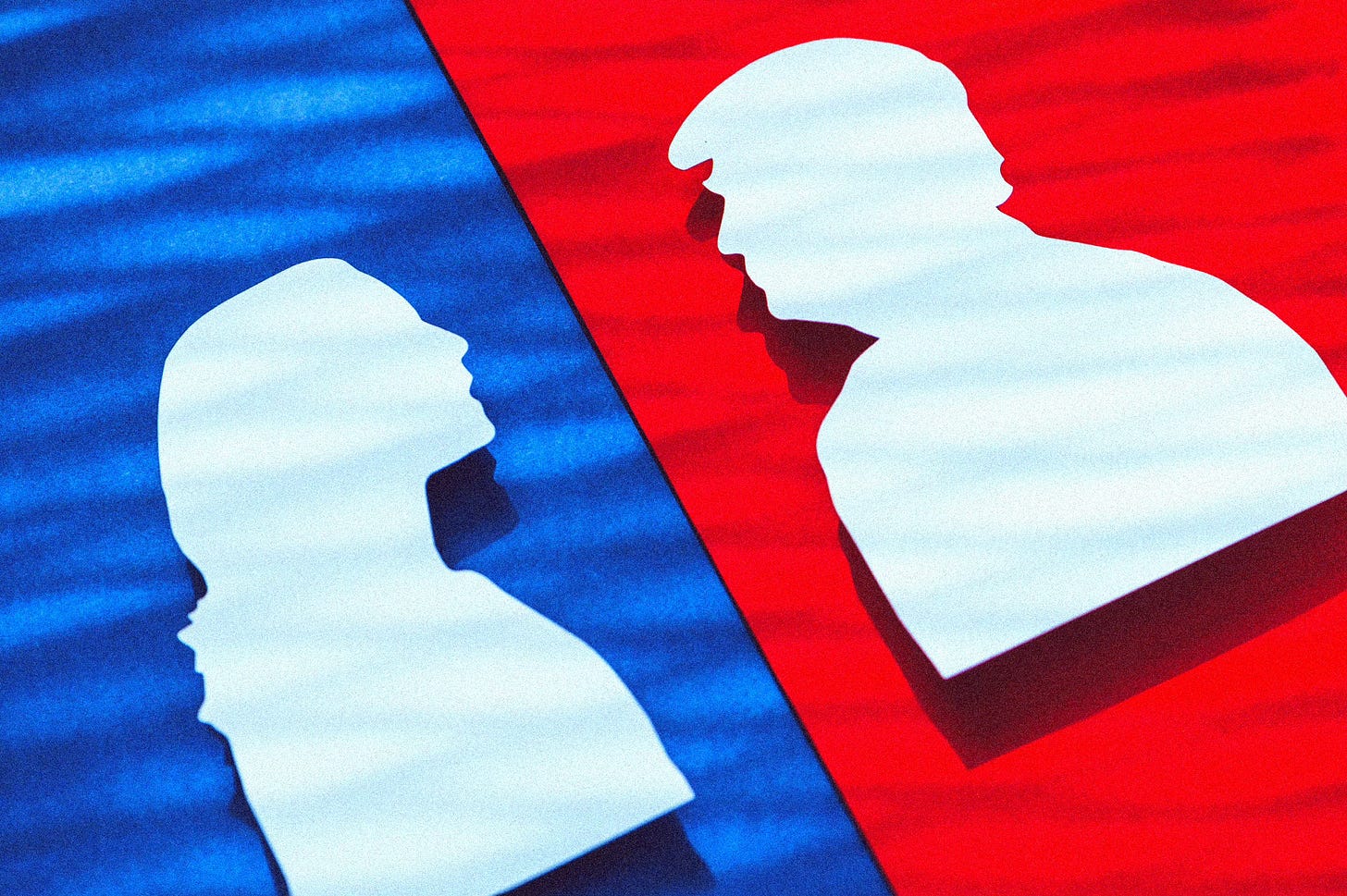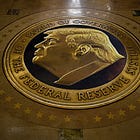Kamala Harris Might be Less Injurious to the American Economy than Trump
Neither is exactly a devotee of Milton Friedman but at least Harris won’t use fiscal and economic policy to settle personal scores and violate the rule of law
Many Americans have fond memories of the state of the economy during the Trump presidency and in the last debate Donald Trump reminded them of that: Until the Covid pandemic hit, inflation was mild, unemployment was low, growth was respectable, and the stock market hit 126 all-time highs. According to a pre-debate poll by the Pew Research Center, 55% of registered voters place greater trust in Trump than Harris on economic issues. Whatever his faults, they regard him as clearly preferable to his Democratic opponent when it comes to economic issues. They are, however, badly mistaken.
It’s not that Harris harbors a secret fondness for Atlas Shrugged or that she is a market enthusiast. She generally mentions corporations only when she’s accusing them of shafting consumers, abusing workers, or crushing competition. Despite majoring in economics at Howard University, and despite declaring “I’m a capitalist,” you will wait in vain to hear her celebrate the vital role of markets in satisfying consumers, generating innovation, and raising living standards.
Still, contrary to MAGA caricatures, she’s far short of a progressive darling: After veering leftward in her 2019 presidential campaign, Harris has moved back to the center, firmly abandoning her endorsement of “Medicare for all,” a ban on fracking, and higher taxes on everyone making more than $100,000 a year. Although her campaign has been light on specifics, it’s safe to classify her as a standard Democrat, not the rabid leftist who inhabits GOP fantasies. And given that she seized the presidential nomination without a fight, she owes nothing to the party’s ultra-progressive faction.
When we carefully consider the various categories of economic policy that will be affected by the next president, the majority of Americans are mistaken: Trump is not more trustworthy than Harris. Let’s look at his record and positions on various economic issues:
Fed Independence
Trump did more to infringe on the independence of the Federal Reserve than any president since Richard Nixon, repeatedly demanding that the inflation-averse Jerome Powell cut interest rates. He called Powell, whom he appointed as Fed chair, a “bonehead” and an “enemy.” In a second term, Trump intends to meddle even more. “I feel the president should have at least a say in there,” he remarked. He later backed off on that view, but at the very least he would nominate Fed governors who would do his bidding.
Harris, by contrast, has been part of an administration that has left the Fed alone through thick and thin, and she said recently, “The Fed is an independent entity and as president I would never interfere in the decisions that the Fed makes.”
Trade
On trade, Trump was bad in his first term and promises to outdo himself in a second. He vows to impose across-the-board tariffs of 10 to 20%—while slapping Chinese goods with a 60% levy. The Peterson Institute for International Economics figures that 20% duties would cost the average household more than $2,600 a year. That’s before other countries retaliate against U.S.-made goods, as they are sure to do. Import fees don’t only raise the price of imports; they also encourage domestic producers, facing less competition, to raise their prices. Cato Institute analyst Scott Lincicome told me that another downside of Trump’s tariff policy is that “it would require a pretty significant expansion of the regulatory state to enforce.”
Harris labels these tariffs, accurately, as the equivalent of a national sales tax. Unfortunately, free trade is not her thing. The Biden administration left many of Trump’s tariffs in place, and her campaign says she would “employ targeted and strategic tariffs to support American workers, strengthen our economy, and hold our adversaries accountable.” If she deserves a C on the issue, though, Trump has earned a failing grade.
Tax and Fiscal Policy
There’s a modest case to be made for Trump on fiscal policy. The former president wants to extend the tax cuts in his 2017 package, which reduced the corporate income tax rate from 35 to 21%. The individual rates were also cut, with the top rate falling from 39.6% to 37%.
Harris has so far stuck to the tax proposals offered by the administration, which would raise the corporate rate to 28%, bar companies from deducting compensation for any individual that exceeds $1 million per year, restore the top individual rate to 39.6%, and boost the Medicare surcharge for those earning more than $400,000 per year—lifting the top marginal rate as high as 44.6%.
Both candidates agree on one bad idea: exempting tip income from taxation. But with respect to incentives for work and investment, the Trump tax plan outdoes hers.
His fiscal framework, however, would do nothing to stem the tide of red ink in Washington. According to the Penn-Wharton Economic Model, Trump’s spending and tax cuts would pile up at least another $4.1 trillion in deficits over 10 years. He now proposes to cut the corporate rate to 15%, though “solely for companies that make their product in America.” And his plan to abolish taxes on Social Security income would speed the descent of Social Security and Medicare into insolvency. And unlike cuts in marginal income tax rates, it offers no potential supply-side payoff. Because it wouldn’t increase incentives to work and invest, it would do nothing to stimulate growth and thus generate offsetting revenue.
Harris has ambitious budgetary ideas, notably giving families a $3,600 tax credit for each child, as well as a $6,000 credit for the first year of each child’s life. Penn-Wharton concludes her spending and tax plans would raise deficits by at least $1.2 trillion over a decade—far less than her opponent’s.
The Cost of Each Budget
But budgets are not decided mainly in the Oval Office. The next president will have to get any budget proposals through Congress, which will present plenty of obstacles, particularly if Democrats win the House and lose the Senate, currently the likeliest outcome. A Morgan Stanley report estimated that if Democrats were to win the presidency and both houses of Congress, the 10-year deficit would rise by $450 billion. In the event of a GOP trifecta, though, the deficit would grow by $1 trillion. From the standpoint of the national debt, a Harris administration would do less harm. This is not surprising since the previous Trump presidency led to the largest peacetime increases in the national debt.
The Economic Impact of Regulation
The Biden-Harris measures to curb greenhouse gas emissions do exact a cost on the economy. But they are aimed at alleviating something important long recognized by economists: negative externalities, which inflict harms on third parties. Utilities benefit from being able to burn fossil fuels, but they don’t bear the full cost of doing so, which includes polluted air and a warming planet. To be sure, there might be more economically efficient ways to deal with these externalities that would be far preferable than oppressive, top-down regulations that often backfire anyway, but the fact is that although Trump dismantled some regulations in his term, he imposed new ones on companies that rely on immigrants and also vigorously enforced anti-trust regulations on companies and industries that he didn’t like. A Competitive Enterprise Institute report published at the conclusion of Trump’s presidency assessed the Trump years this way: “The overarching reality is that the federal government is larger than ever after four years of Trump, for reasons self-inflicted and for reasons inherent in the logic of growth of the administrative state in response to any crisis.”
He has said nothing to indicate he’ll not do the same again this time.
Climate
In our current political environment, the most efficient weapon against climate change, a carbon tax, is out of the question. So, we have to settle for second-best solutions. Harris is committed to combating climate change, a dire threat, while Trump regards it as a massive hoax deserving no action whatsoever. For anyone who recognizes the dangers posed by climate change and the need to reduce greenhouse gas emissions, she is the only option.
Markets and Prices
Perhaps Harris’s biggest economic misstep in the campaign so far is her proposal to enact a federal ban on price-gouging, a concept regarded as fallacious by the great majority of economists. Jason Furman, who chaired the Council of Economic Advisers under President Obama, scorned the idea: “There’s no upside here, and there is some downside.”
But the claim that Harris was advocating federal price controls is a gross distortion. As it happens, 37 states already have such laws, and they haven’t led to price controls. Sources close to the campaign told The New York Times that her plan “would be narrowly tailored to the food and grocery industries. … It would not rely on numerical targets—like automatically triggering action if prices rise by a certain amount. Crucially, it would likely be reserved for emergency situations, like the immediate aftermath of a natural disaster or the thick of a pandemic.” It’s a lame idea, but probably worse in principle than it would be in practice.
Housing Costs
One of the most important microeconomic problems facing the country is the scarcity and high cost of housing, which are largely the product of onerous policies that constrain supply at the local level. The Biden administration has used the limited powers the federal government has to encourage cities to ease “restrictive and costly land use and zoning rules” with the goal of generating two million new homes. Harris has gone further, promising “3 million new homes and rentals that are affordable for the middle class” in her first term. (Her proposed $25,000 tax credit for first-time home buyers would serve mainly to put additional upward pressure on prices.) Economist Noah Smith assesses that her plan is consistent with YIMBY, or “yes in my backyard,” principles, as opposed to the NIMBY, or “not in my backyard,” movement:
[T]he Harris economic program … [is] solidly in line with the YIMBY movement that has been winning victories at the state level. The key to the YIMBY movement is that it emphasizes goals over methods—the idea is to build housing by any means necessary, including deregulation, tax incentives, and government housing construction all at once. Harris’s plan embodies this all-of-the-above approach.
Trump, by contrast, has complained that Democrats would “eliminate single-family zoning, bringing who knows into your suburbs, so your communities will be unsafe and your housing values will go down.” On this issue, the federal government has little direct power—but a president willing to use her bully pulpit to promote zoning and land use reform could make a big difference in what municipal officials do.
Immigration
One of Trump’s most alarming economic policies isn’t primarily about economics in the first place: His plan to expel millions of undocumented immigrants in what the GOP envisions as “the largest deportation effort in American history.” Laura Collins, an immigration expert at the George W. Bush Institute in Dallas, says such an operation would cost “billions of dollars. It would probably take 20 years. It would cause the economy to shrink.” Brad DeLong, an economist at the University of California, Berkeley, sees a catastrophe in the making. “Trump tariffs and mass deportation, taken together, would be the largest adverse supply shock ever inflicted on the American economy,” he wrote. “They would in all likelihood generate a combination of inflation and depression America has never before seen.” The jobs these migrants do, the demand they create, and the taxes they pay would all be gone. And even companies that don’t employ them would be caught in the enforcement dragnet.
Harris would most likely continue the Biden administration’s efforts to reduce illegal crossings at the southern border. But she would also work to protect undocumented foreigners who came here as children or who are married to U.S. citizens, as Biden has—an approach that is not only humane but economically beneficial.
The Rule of Law
Policy details aside, Harris is unquestionably more trustworthy when it comes to one of the foundations of a healthy capitalist economy: the rule of law. Trump’s shocking and possibly criminal efforts to overturn the 2020 election ought to disqualify him with anyone who recognizes the importance of a stable constitutional order for economic prosperity. He has nothing but contempt for any laws that stand in his way, as he has shown time and again. And the Supreme Court decision granting the president broad immunity from criminal prosecution will only embolden Trump to abuse his authority. A leader who feels no need to obey the nation’s laws is one every CEO and entrepreneur should fear.
As president, Trump was often the enemy of business executives, confirming what Rachel Kleinfeld previously noted in our pages: “even supposedly pro-business populism is bad for business.” He frequently waged rhetorical war on corporations that offended him in one way or another—by closing factories, moving jobs abroad, endorsing stricter auto emission rules or using Colin Kaepernick in an ad campaign. As the late Cato Institute vice president David Boaz said of Trump’s attacks, “It’s the president of the United States, the man with the biggest microphone in the world, who might just single you out for abuse.” In a second term, the threat would be even greater. Trump has said he would feel free to use the Justice Department to kneecap his political rivals: “If I happen to be president, and I see somebody who’s doing well and beating me very badly, I say, ‘Go down and indict them.’” He could do the same to businesspeople who incur his wrath.
Harris may denounce alleged price gouging or corporate greed, but she is not a clear and present danger to the Constitution or the criminal code. If she thinks Amazon is engaging in unfair tactics, she may use antitrust laws against Jeff Bezos, but he needn’t fear being perp-walked.
A Harris presidency would undoubtedly offer many grounds for criticism on economic policy. But contrary to GOP hysteria, she’s no Marxist. The evidence makes it clear that, compared to Trump, she poses less of a danger to the economy, the people who make it function, and the legal order on which it rests. Autocrats are the enemy of a liberal economic system, because it requires placing most economic matters beyond the control of the leader. Those who see Trump as the better alternative are falling victim to delusions that pose a far greater danger to the economy than Big Government ever has.
© The UnPopulist, 2024










The impact of Presidents on the economy is greatly exaggerated.
The imposition of tariffs is supposed to be the task of the Congress but like waging war has been given over to our imperial presidency. That is what makes Trump a relatively greater threat to the economic well being of most Americans as consumers in the short term. The market will shift to compensate for the tariffs BUT there will be a time lag before that happens.
Either Harris or Trump will have relatively little impact on the very wealthy and the very poor.
The greatest fraud perpetrated on populations in every nation is that leaders and political parties can claim credit for good economic performance. Logically it is false to say they can control bad economic outcomes.
Market forces determine the trajectory of the economy not governments. Sure they can diminish the consequences and enhance benefits from the general trends.
The most significant economic driver that we DO control is deficit spending and the accumulation of debt and the printing of money and to be honest neither candidate and certainly neither party is serious about those fundamental things over which they do have control.
The real reason to support Harris (as most Republicans who haven't lost their integrity are doing) is simply because she is the only person running for the office of President whereas the other guy is running simply to keep his ass out of prison and fill his bank accounts and strike beneficial deals for his future interests. Oh, yes, the criminally corrupt candidate was, is and always will be totally unqualified and temperamentally unfit to be the President of the United States of America.
Harris may well be "Less Injurious to the American Economy than Trump", but maybe much more damaging in many other more fundamental ways.
When Harris boots "Rachel Levine" out of the White House, acknowledges the Cass Report, repudiates Biden's Title IX claptrap, and recognizes "How the Democrats and the Left Betrayed Women and Girls" is maybe when my "doubts", and those of many others, about the Democrats would be alleviated enough to consider voting for Harris.
https://www.nytimes.com/2024/07/12/opinion/gender-affirming-care-cass-review.html?unlocked_article_code=1.Ek4.WYYy.3PjXOAQyHVS3&smid=url-share
https://www.nytimes.com/2024/05/13/health/hilary-cass-transgender-youth-puberty-blockers.html?unlocked_article_code=1.KU4.bs-p.ZuW2Zdo_Ibwd&smid=url-share
https://www.amazon.ca/dp/B0CN32BXC2/ref=cbw_us_ca_dp_narx_gl_book
A couple of "doubts" there that you might "heed". At least give some thought to.